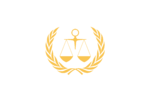International Justice Court
| International Justice Court | |
|---|---|
| Curia Internationalis Iustitiæ | |
 Flag of the International Justice Court | |
| Location | Alba Concordia |
| Authorized by | Code of the League of Nations |
| Chief Justice | |
| Currently | Mikel Reilly |
| Associate Justice | |
| Currently | Rocio Noyola |
| Associate Justice | |
| Currently | Rachet d’Everard |
The International Justice Court (Latin: Cura Internationalis Iustitiæ) is the judicial body of the League of Nations and the premier venue for the arbitration of disputes under international law. Created in 1961, the Court's primary functions are to settle international legal disputes submitted by states (contentious cases), oversee cases relating to human rights as defined by the Code of the League of Nations and to give advisory opinions on legal issues referred to it.
The Court's mandatory jurisdiction comes from three sources: the Code of the League of Nations, general international conventions and special bipartite international treaties. The Court can issue either judgments or advisory opinions. Judgments are directly binding while advisory opinions were not. On occasion, the Court has been accused of extending its jurisdiction. Strictly speaking, it was allowed to intervene only in matters of international law or law specifically brought to it by firms in two nations.
History
Set up xxxx in the aftermath of the Second Great War(?)
Activities
Composition
The Court is composed of three judges, one Chief Justice and two Associate Justices all of different nationalities. The judges are nominated by the sitting Provost-General of the League of Nations and ratified by the General Assembly by a simple majority.Judges normally serve for two years but in extraordinary situations when presiding over particularly important cases, a judge's term may be extended until the conclusion of said cases.